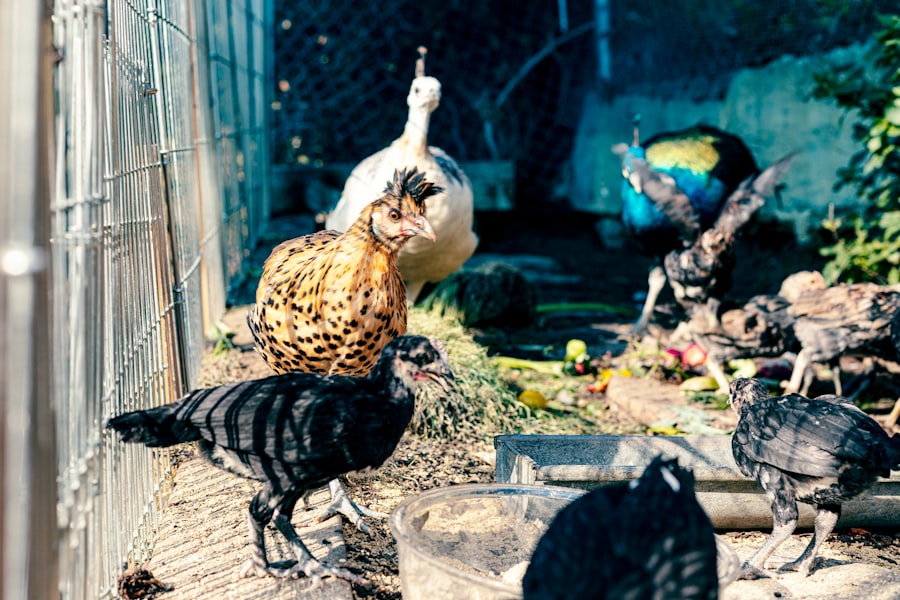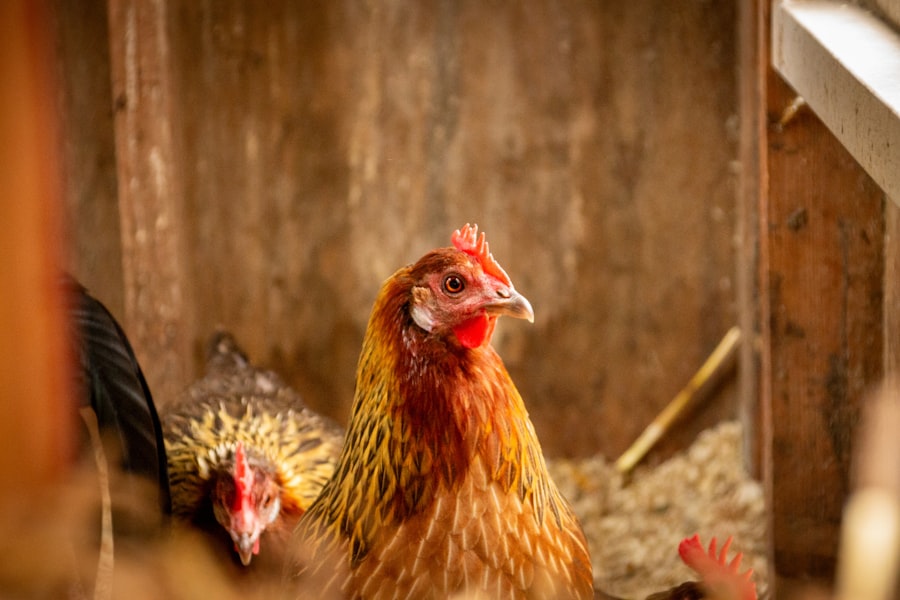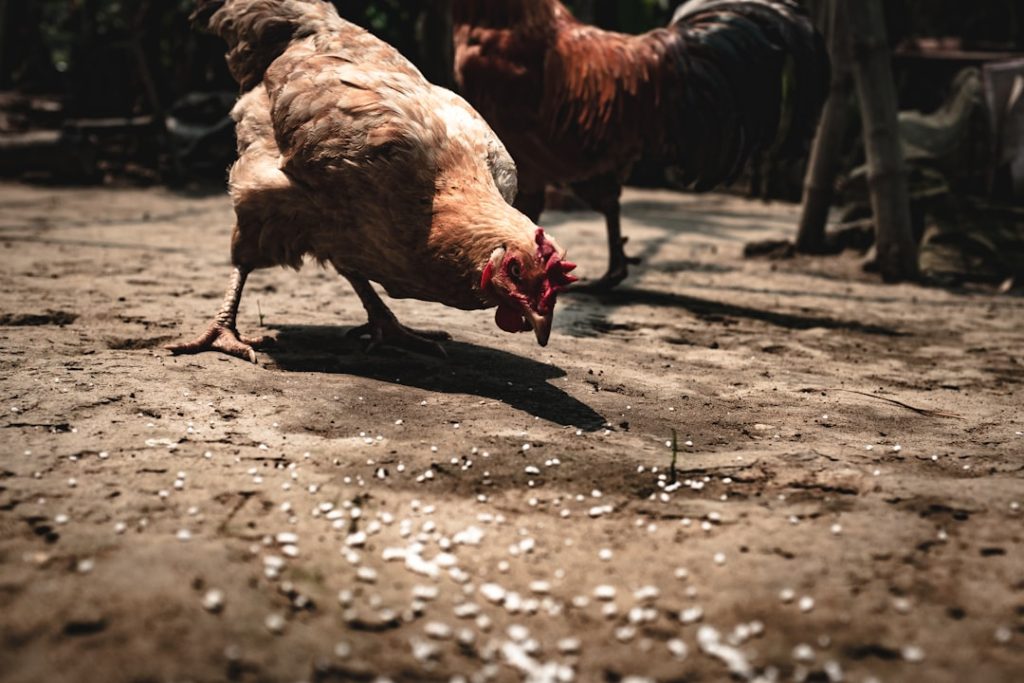When selecting chicken breeds for a backyard flock, several factors should be considered. Climate is a crucial element, as some breeds are better adapted to cold environments, while others thrive in warmer conditions. The intended purpose of the flock is also important, whether it’s for egg production, meat, or companionship.
Different breeds excel in various areas, such as egg-laying capacity, meat quality, or friendly demeanor. Space availability is another key consideration. Certain breeds are more suitable for confined areas, while others require more space to roam.
Noise levels should be taken into account, especially for those living in close proximity to neighbors, as some breeds are known to be louder than others. Temperament is an essential factor, particularly for families with children. Some breeds are known for their docile and friendly nature, while others may be more independent or potentially aggressive.
The breed’s foraging ability can be beneficial, as some chickens are adept at finding insects and plants to supplement their diet. Lastly, the visual appearance of the breed may be a consideration for some flock owners. Chickens come in a diverse range of colors and patterns, allowing for aesthetic preferences to be taken into account.
Thorough research and careful consideration of specific needs and preferences are recommended before making a final decision on chicken breeds for a backyard flock.
Table of Contents
Key Takeaways
- When choosing a breed, consider factors such as climate, space, and egg production to find the right fit for your needs and environment.
- Building a coop requires careful planning to ensure proper ventilation, insulation, and predator-proofing to keep your chickens safe and comfortable.
- Providing a balanced diet with access to fresh water and appropriate supplements is essential for the health and productivity of your chickens.
- Regular health checks, vaccinations, and a clean living environment are crucial for maintaining the welfare and well-being of your flock.
- Understanding the factors that affect egg production, such as age, breed, and diet, can help you optimize your chickens’ laying potential and overall productivity.
- Implementing predator-proofing measures, such as secure fencing and locking coop doors, is essential for protecting your chickens from potential threats.
- Integrating chickens into your lifestyle requires time, effort, and commitment, but the rewards of fresh eggs and the joy of caring for your flock can be immensely fulfilling.
Building a Coop
Space and Ventilation
Chickens need room to move around, roost, and lay eggs comfortably. A good rule of thumb is to provide at least 2-3 square feet of space per chicken inside the coop, and 8-10 square feet per chicken in the outdoor run area. Additionally, make sure the coop is well-ventilated to prevent moisture buildup and ammonia levels from rising. Proper ventilation will also help regulate the temperature inside the coop, keeping your chickens comfortable in both hot and cold weather.
Predator-Proofing
Another important aspect of building a coop is ensuring that it is predator-proof. This means using sturdy materials and hardware cloth to prevent predators from digging under or breaking into the coop. Consider adding a secure latch to the door and covering any windows with strong wire mesh.
Roosting and Nesting
It’s also important to provide a safe and secure area for your chickens to roost at night. Install roosting bars at varying heights to accommodate different preferences and provide nesting boxes for your hens to lay their eggs.
Coop Placement
Finally, consider the placement of the coop in your yard. Choose a location that is well-drained and provides some natural shade. Building a coop can be a fun and rewarding project, but it’s important to take the time to plan and build a space that meets the needs of your flock.
Feeding and Nutrition

Proper feeding and nutrition are essential for keeping your backyard chickens healthy and productive. When it comes to feeding your flock, there are several key considerations to keep in mind. First and foremost, chickens require a balanced diet that includes protein, carbohydrates, vitamins, and minerals.
A good quality commercial feed will provide the essential nutrients your chickens need, but it’s also important to supplement their diet with fresh fruits and vegetables, as well as occasional treats like mealworms or kitchen scraps. Additionally, make sure your chickens have access to clean, fresh water at all times. Water is essential for digestion, egg production, and regulating body temperature.
Another important aspect of feeding your chickens is providing access to grit and oyster shells. Grit helps chickens grind their food in their gizzards, while oyster shells provide calcium for strong eggshells. Both of these supplements are essential for maintaining good digestive health and egg production in your flock.
It’s also important to consider the feeding schedule for your chickens. Most backyard flocks do well with free-choice feeding, where food is available at all times. However, some owners prefer to feed their chickens at specific times of day to monitor their intake and reduce waste.
Ultimately, it’s important to observe your flock and adjust their feeding regimen based on their individual needs. By providing a balanced diet and monitoring their intake, you can ensure that your chickens stay healthy and productive.
Health and Welfare
Maintaining the health and welfare of your backyard chickens is essential for their overall well-being and productivity. There are several key aspects to consider when it comes to keeping your flock healthy. First and foremost, it’s important to observe your chickens regularly and be familiar with their normal behavior and appearance.
This will help you quickly identify any signs of illness or injury. Additionally, provide a clean and dry living environment for your chickens to prevent the spread of disease and parasites. Regularly clean the coop and nesting boxes, and provide fresh bedding to keep your flock comfortable and healthy.
Another important aspect of maintaining the health of your flock is providing regular access to veterinary care. Find a veterinarian who is experienced in poultry care and schedule regular check-ups for your chickens. Additionally, familiarize yourself with common poultry diseases and parasites so you can take preventative measures to protect your flock.
It’s also important to practice good biosecurity measures to prevent the introduction of disease into your flock. This includes quarantining new birds before introducing them to your existing flock and limiting exposure to wild birds or other potential carriers of disease. In addition to physical health, it’s important to consider the welfare of your chickens in terms of their mental and emotional well-being.
Provide enrichment activities such as perches, dust baths, and toys to keep your chickens stimulated and engaged. Additionally, consider the social dynamics within your flock and be prepared to intervene if any bullying or aggression occurs. By prioritizing the health and welfare of your backyard chickens, you can ensure that they lead happy and fulfilling lives.
Egg Production
For many backyard chicken owners, egg production is one of the main reasons for keeping a flock. There are several key factors that can impact egg production in your chickens. First and foremost, it’s important to provide a balanced diet that includes high-quality commercial feed as well as access to fresh water, grit, and oyster shells.
Proper nutrition is essential for maintaining good egg production in your flock. Additionally, make sure your chickens have access to natural light, as this can stimulate egg laying. Another important aspect of egg production is providing comfortable nesting boxes for your hens.
Nesting boxes should be dark, quiet, and private spaces where hens can lay their eggs without disturbance. Make sure there are enough nesting boxes for all of your hens, with at least one box for every 4-5 hens in your flock. Keep the nesting boxes clean and provide soft bedding material such as straw or wood shavings.
It’s also important to consider the age of your hens when it comes to egg production. Most hens will start laying eggs around 5-6 months of age and will continue laying consistently for 2-3 years before production starts to decline. Factors such as breed, genetics, and individual health can also impact egg production in your flock.
By providing a balanced diet, comfortable nesting boxes, and proper care for your hens, you can maximize egg production in your backyard flock.
Predators and Protection

Designing a Predator-Proof Enclosure
When designing your coop and outdoor run area, it’s important to use sturdy materials such as hardware cloth or welded wire fencing to prevent predators from digging under or breaking into the enclosure. Additionally, consider adding a secure latch to the coop door and covering any windows with strong wire mesh.
Providing a Safe Roosting Area
Another important aspect of protecting your flock from predators is providing a safe area for them to roost at night. Make sure the coop is secure from all angles and consider adding motion-activated lights or alarms as an extra deterrent for nocturnal predators.
Additional Protection Measures
It’s also important to supervise free-ranging chickens during the day to ensure they are safe from aerial predators such as hawks or owls. In addition to physical protection measures, consider using deterrents such as predator-safe fencing or netting around the perimeter of your property to discourage predators from approaching your coop. Finally, consider getting a livestock guardian animal such as a dog or even a pair of geese to help protect your flock from potential threats.
By taking proactive measures to protect your chickens from predators, you can ensure that they stay safe and secure in their environment.
Integrating Chickens into Your Lifestyle
Integrating chickens into your lifestyle can be a rewarding experience that provides numerous benefits beyond just fresh eggs. Chickens can help reduce food waste by eating kitchen scraps and providing natural pest control by eating insects in your yard. Additionally, they can provide fertilizer for your garden by producing nutrient-rich manure.
Another benefit of integrating chickens into your lifestyle is the opportunity for educational experiences for children or adults alike. Caring for chickens can teach responsibility, empathy, and valuable life skills such as gardening or basic animal husbandry practices. Chickens also have a calming effect on many people due to their gentle clucking sounds and amusing behaviors such as dust bathing or scratching for food in the yard.
Many people find that spending time with their chickens can be a form of therapy or stress relief. Finally, integrating chickens into your lifestyle can provide an opportunity for community engagement by sharing eggs with neighbors or participating in local agricultural events such as farmers’ markets or poultry shows. In conclusion, keeping backyard chickens can be a fulfilling experience that offers numerous benefits beyond just fresh eggs.
By carefully choosing the right breed for your needs, building a secure coop, providing proper nutrition and healthcare, maximizing egg production, protecting from predators, and integrating them into your lifestyle, you can create a happy and healthy environment for both you and your feathered friends.
If you’re interested in keeping chickens, you may also want to consider keeping ducks. Ducks can be a great addition to your backyard flock, and they have their own specific dietary needs. Check out this article on what you should feed ducks to learn more about how to care for these delightful waterfowl.
FAQs
What are the benefits of keeping chickens?
Keeping chickens can provide a sustainable source of fresh eggs, natural pest control in the garden, and a source of organic fertilizer for plants.
What do chickens need to thrive?
Chickens need a secure and predator-proof coop, access to fresh water, a balanced diet of feed and kitchen scraps, and space to roam and forage.
What are some common health issues for chickens?
Common health issues for chickens include mites and lice, respiratory infections, and egg-laying problems. Regular health checks and proper hygiene can help prevent these issues.
How can I keep my chickens safe from predators?
To keep chickens safe from predators, it’s important to secure the coop with strong fencing, lock the coop at night, and use deterrents such as motion-activated lights or sound devices.
What are some important considerations for city dwellers who want to keep chickens?
City dwellers who want to keep chickens should check local regulations and obtain any necessary permits. They should also consider noise and odor concerns, and ensure that their coop is well-maintained and clean.
Meet Walter, the feathered-friend fanatic of Florida! Nestled in the sunshine state, Walter struts through life with his feathered companions, clucking his way to happiness. With a coop that’s fancier than a five-star hotel, he’s the Don Juan of the chicken world. When he’s not teaching his hens to do the cha-cha, you’ll find him in a heated debate with his prized rooster, Sir Clucks-a-Lot. Walter’s poultry passion is no yolk; he’s the sunny-side-up guy you never knew you needed in your flock of friends!







